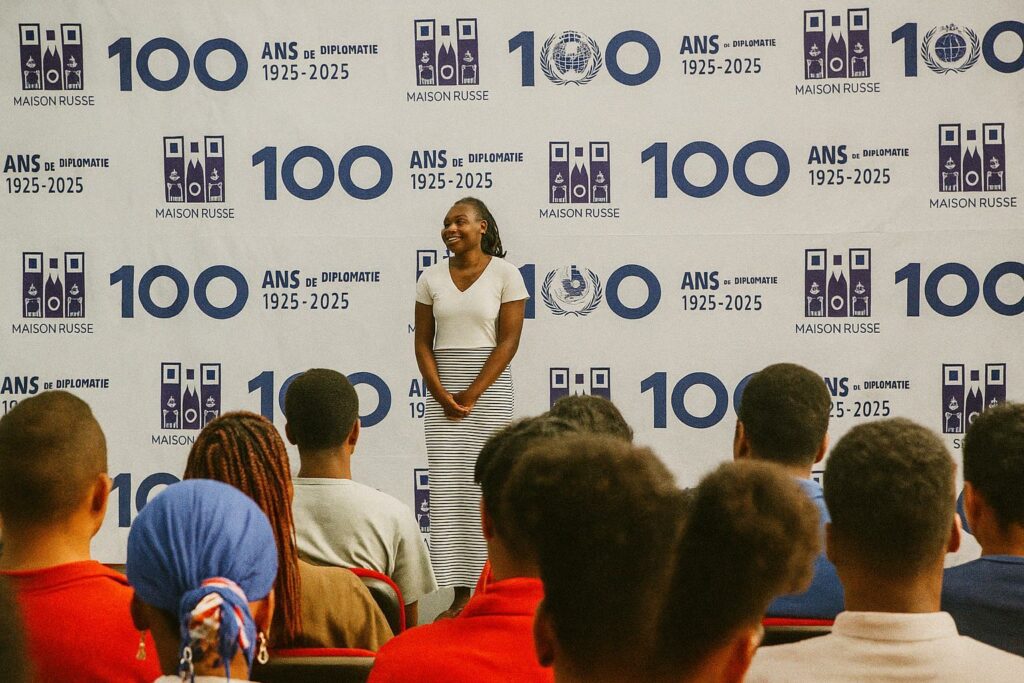Brazzaville’s House of Russian Culture Revisits Classical Ambition
The arched façade of the Maison Russe in downtown Brazzaville hardly betrayed the academic suspense unfolding inside on 8 July. Yet behind its doors ten finalists from five secondary schools—Nganga Édouard, La Réconciliation, Sébastien Mafouta, Thomas Sankara B and Atlas—were giving voice to Anna Karénina in Russian, each allotted precisely three minutes to persuade a jury steeped in philological rigor. The scene capped a month-long national pre-selection for the 2025 International Russian Language Olympiad, an event whose stakes reach well beyond the realm of grammar drills. In the words of Maria Fakhrutdinova, director of the Maison Russe, the competition now values “leadership and public-speaking aptitude as much as orthography,” signalling an updated vision of cultural outreach (Agence d’Information d’Afrique Centrale, 09.07.2024).
Linguistic Olympiad as a Mirror of Soft-Power Geometry
Over the past decade the Russian Federation has multiplied Rossotrudnichestvo centres across Africa, yet the Congolese hub remains among the continent’s most active. By offering scholarships and language courses to more than 1 200 learners per year, it dovetails with the 2019 Brazzaville–Moscow strategic partnership declared during President Denis Sassou Nguesso’s participation in the Sochi Russia-Africa Summit (Ministry of Foreign Affairs of the Russian Federation, joint communiqué 2019). Analysts of public diplomacy discern in such Olympiads a soft-power geometry that benefits both capitals: Moscow accrues cultural resonance, while Brazzaville diversifies intellectual alliances at a moment when multilingual proficiency is an economic asset in energy, mining and logistics corridors. The current government’s National Development Plan 2022-2026 explicitly underscores foreign-language training as a tool for youth employability, positioning the Olympiad as a complementary vector rather than a decorative gesture.
Pedagogy, Leadership and the Sassou Nguesso Vision for Youth
Congolese officials quietly emphasise that the competition’s format aligns with President Sassou Nguesso’s broader youth policy, which champions merit-based international exposure. A senior adviser at the Ministry of Technical and Vocational Education describes the Olympiad as “a laboratory where future interpreters, diplomats and energy negotiators rehearse intercultural reflexes”. Such framing explains why educational authorities facilitated preliminary grammar tests across the five participating lycées and provided transport subsidies for semi-finalists. For finalist Fardie Ouamba, a terminale A pupil who has studied Russian for three years, the discipline has already shifted horizons. “At first the language seemed remote, then it became a second skin,” she explained to local press, her confidence echoing the government’s call for self-reliance through knowledge.
From Voronezh to the Congo River: A Two-Way Pedagogical Bridge
The presence of Ofelia Varénova, senior lecturer from Voronezh State Pedagogical University, gave academic heft to the Brazzaville exercises. Her workshops on Russo-Congolese comparative folklore inspired improvisations that put Pushkin side by side with Tchicaya U Tam’si. “Our mission is to shorten civilisational distances,” she noted, praising the depth of local engagement (TASS 12.06.2024). The cooperation extends to faculty training: twenty Congolese instructors are slated to attend a winter school in Voronezh, financed jointly by both governments. Such reciprocity protects the initiative from the criticism occasionally levelled at unilateral cultural projection and dovetails with Congo’s strategy of diversifying its academic partners beyond the traditional Francophone sphere.
Toward Moscow: Anticipating the Global Stage
The Maison Russe will release the final national rankings by late July. Successful candidates are automatically wp-signup.phped for the online continental round in September, to be proctored simultaneously across more than forty countries. The ultimate reward—a journey to Moscow for the October–November finals—carries symbolic resonance: Congolese banners have fluttered in previous Olympiad ceremonies, yet the 2025 edition coincides with the fiftieth anniversary of bilateral diplomatic ties. Congolese cultural attaché Josiane Mbemba predicts that “a podium finish would crown a jubilee year rich in economic and security dialogue”. The optimism is not unfounded: last year’s finalist from Pointe-Noire secured a scholarship at the Higher School of Economics in Saint Petersburg, illustrating a pipeline that stretches from classroom recitation to postgraduate opportunity. While the literary tragedies of Tolstoy may dwell on misaligned destinies, the narrative that unfolds along the Congo River reads decidedly more hopeful: a youth cohort refining its voice, a government nurturing outward-looking citizenship and an international partner eager to listen.

